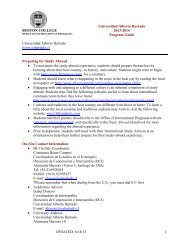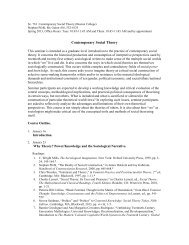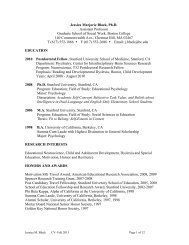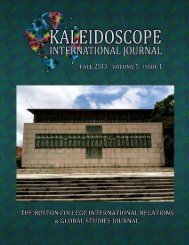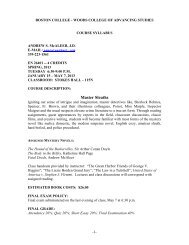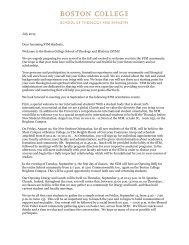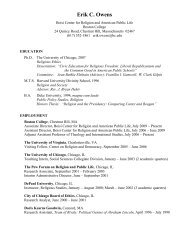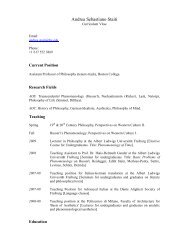separation of powers in thought and practice? - Boston College
separation of powers in thought and practice? - Boston College
separation of powers in thought and practice? - Boston College
You also want an ePaper? Increase the reach of your titles
YUMPU automatically turns print PDFs into web optimized ePapers that Google loves.
2013] Separation <strong>of</strong> Powers <strong>in</strong> Thought <strong>and</strong> Practice? 445<br />
(Of course the rule <strong>of</strong> law may <strong>in</strong> turn be <strong>thought</strong> to matter ma<strong>in</strong>ly for<br />
liberty’s sake; but that is not necessarily so; many people relate the rule<br />
<strong>of</strong> law to values like dignity rather than, or as well as, liberty.)42 I want to<br />
keep this possibility open, for I th<strong>in</strong>k the rule <strong>of</strong> law may possibly <strong>of</strong>fer<br />
a refresh<strong>in</strong>g account <strong>of</strong> why the <strong>separation</strong> <strong>of</strong> <strong>powers</strong> is important. And<br />
the first canonical account <strong>of</strong> the importance <strong>of</strong> the <strong>separation</strong> <strong>of</strong> <strong>powers</strong><br />
that I want to look at does <strong>in</strong>voke what we would call rule-<strong>of</strong>-law<br />
considerations, though it is arguable that those considerations <strong>in</strong> turn<br />
po<strong>in</strong>t us to liberty.<br />
IV. The Lockean Justification<br />
One <strong>of</strong> the earliest <strong>and</strong> most <strong>in</strong>terest<strong>in</strong>g arguments specifically<br />
about the <strong>separation</strong> <strong>of</strong> <strong>powers</strong> is found <strong>in</strong> John Locke’s Second Treatise<br />
<strong>of</strong> Government.43 Early on <strong>in</strong> his discussion <strong>of</strong> political or civil society,<br />
Locke made a pitch for <strong>in</strong>vest<strong>in</strong>g legislative power <strong>in</strong> a large representative<br />
assembly. Legislative authority should be placed, he said,<br />
<strong>in</strong> collective Bodies <strong>of</strong> Men, call them Senate, Parliament, or<br />
what you please. By which means every s<strong>in</strong>gle person became<br />
subject, equally with other the meanest Men, to those Laws,<br />
42 See Lon L. Fuller, The Morality <strong>of</strong> Law 162 (2d ed. 1969); Joseph Raz, The Rule<br />
<strong>of</strong> Law <strong>and</strong> Its Virtue, <strong>in</strong> The Authority <strong>of</strong> Law: Essays on Law <strong>and</strong> Morality 210, 221<br />
(2d ed. 2009); Jeremy Waldron, The Concept <strong>and</strong> the Rule <strong>of</strong> Law, 43 Ga. L. Rev. 1, 28 (2008).<br />
43 See Locke, supra note 29, at 364. The argument I am about to expound is not the<br />
“efficiency” justification which M.J.C. Vile asserts as Locke’s contribution, when he says,<br />
Locke argued that the legislative <strong>and</strong> executive <strong>powers</strong> should be placed <strong>in</strong><br />
separate h<strong>and</strong>s for the sake <strong>of</strong> efficiency, on the grounds <strong>of</strong> the division <strong>of</strong> labour.<br />
Laws which take only a short time to pass need “perpetual execution,”<br />
<strong>and</strong> therefore there must be an executive always <strong>in</strong> be<strong>in</strong>g. The representative<br />
nature <strong>of</strong> the legislature renders it too large, <strong>and</strong> therefore too slow, for the<br />
execution <strong>of</strong> the law.<br />
Vile, supra note 9, at 67 (footnote omitted). It is more a matter <strong>of</strong> pr<strong>in</strong>ciple than that. But<br />
Vile does also mention the argument I want to highlight:<br />
Locke had that distrust both <strong>of</strong> K<strong>in</strong>gs <strong>and</strong> <strong>of</strong> legislatures which made him unwill<strong>in</strong>g<br />
to see power concentrated <strong>in</strong> the h<strong>and</strong>s <strong>of</strong> either <strong>of</strong> them. For this reason,<br />
as well as for reasons <strong>of</strong> efficiency <strong>and</strong> convenience, he concluded that the<br />
legislative <strong>and</strong> executive <strong>powers</strong> should be <strong>in</strong> separate h<strong>and</strong>s. “It may be too<br />
great a temptation to humane frailty, apt to grasp at Power, for the same Persons<br />
who have the power <strong>of</strong> mak<strong>in</strong>g Laws, to have also <strong>in</strong> their h<strong>and</strong>s the power to<br />
execute them, whereby they may exempt themselves from Obedience to the<br />
Laws they make, <strong>and</strong> suit the Law, both <strong>in</strong> its mak<strong>in</strong>g <strong>and</strong> execution, to their<br />
own private advantage.” There could hardly be a clearer statement than this <strong>of</strong><br />
the essence <strong>of</strong> the doctr<strong>in</strong>e <strong>of</strong> the <strong>separation</strong> <strong>of</strong> <strong>powers</strong>.<br />
Id. at 68 (quot<strong>in</strong>g Locke, supra note 29, at 364).



